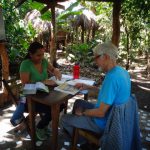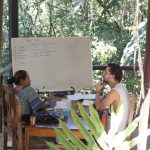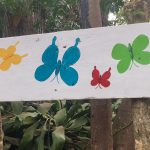
PERMACULTURE PROJECT AT LA MARIPOSA
The word “permaculture” is often associated with organic farming. Of course this is a part of it – and an important part – but by no means the whole story. At La Mariposa we have integrated permaculture principles into all aspects of our work and have added an ethic to the basic 3 (care for the earth, care for people, and fair share) which is respect and care for animals, both domestic and wild. This has to be a critical element, especially in the modern day world of the cruelties and abuses of factory farming especially of pigs, chickens and increasingly cattle both beef and dairy, the widespread destruction of forests for cattle ranching and the overfishing of rivers and oceans. In this sense we should not be “imitating the relationships found in natural ecologies” too closely as the human race is, frankly, too powerful and too destructive a predator – the current rate of extinctions of other species is terrifying. Thus we include protection of our wildlife, rescue of injured or neglected animals and a largely vegetarian diet as part of our Mariposa permaculture principles. Additionally, the human body also benefits from ingesting less meat and more vegetables and legumes and we have also discovered the therapeutic benefits of horses and dogs for humans – a further example of integration in our practice.
Of course you cannot in practice care for people or animals without caring for the earth – so it is a holistic, integrated approach that is required of us all. We certainly need to observe and analyse what is going on around us both in the immediate vicinity and globally (Nicaragua is already dramatically affected by climate change) and then open ourselves to learning what works in the here and now to improve the situation
Ethic – Caring for People
La Mariposa started some 12 years ago as an employment project – to try and help the local community by finding a way of offering sustainable employment. From 5 employees we now have over 80 (not all full time permanent workers) from Spanish teachers to organic gardeners. We opt to maximize the chances of employment so wages are reasonable but not high – we also provide attractive working conditions and adhere to labor laws. Our workforce is exclusively drawn from the local community and we ensure that visiting volunteers contribute skills and labor but never replace a paid worker.
We fund several children’s projects in the poorest barrios of La Concha. For example, in the barrio of Panama we try and give young children a head start by offering English classes (this also has the side benefit of providing extra work for our teachers) which have proved very popular. Other projects assist with reading and writing skills and provide opportunities for craft work, learning folklore dancing and play!
Our biggest project by far is Chispa de Vida supporting disabled children and their families (as well as providing jobs for 5 people). We offer physical therapy, equino therapy – using our rescued horses, thus integrating two projects – hydro therapy and educational help. Sustainable materials including straw, adobe and recycled tires were used to construct the buildings and playground, and as an added bonus, it is really beautiful, fitting in with the environment. Furthermore, this project is situated in our urban Nature Reserve so everyone will be able to relax and enjoy natural surroundings.
Ethic – Caring for Animals
La Mariposa funds a range of initiatives following the principle that animals, both domestic and wild, are an integral part of our environment. We do not serve red meat – many of the animals are raised and slaughtered in “industrial” conditions which are cruel, often also polluting the surrounding environment. We do serve chicken and fish though there is no real justification for doing so except human demand (note the chickens are often given huge doses of hormones so they grow at great speed which of course is accumulatively damaging to human health). We always offer a vegetarian alternative for those aware of this.
Approximately 2000 dogs and cats have been spayed and neutered under a Mariposa program, working jointly with World Vets in Granada. We actively care for over 100 rescued dogs and cats (many more have been adopted), 20 horses and provide veterinary services to local people who could not otherwise afford it. We hold “free pet days” offering treatment to eliminate parasites. We take care of several monkeys and parrots who cannot be released into the wild due to loss of habitat or they are too tame to survive.
Animals we have released into our Nature Reserve or other suitable locations include over 50 iguana, 200 parakeets, armadillos, foxes, and howler monkeys. We continually try to provide mammals, reptiles, birds and insects with a fair share of our land, our food, our water to ensure their survival.
Ethic – Caring for the Earth
Trying to implement this principle requires challenging the demands of the ever encroaching consumerist ethic which encourages a focus on THINGS, not relationships. However, it is important that those who come from the West with our fancy “organic” ideas need to remember that in Latin America, for example, the emphasis has been on pushing Westernization of culture, of agriculture and so it is somewhat arrogant to be suddenly saying “actually you indigenous peoples had it about right….life 500 years ago was probably better than it is today”. The response may well be along the lines of “yeah right, you in the West have it all and now you are telling us not to consume so much………” Tricky.
However, caring for the earth is paramount and one way is bringing to life existing but often dormant knowledge/s about traditional farming methods as well as incorporating ideas about saving water, using less chemicals generally (eg soap) and not creating waste by following the principle of REDUCE REUSE RECYCLE (with the emphasis on the first!).
Fair Share Ethic
This one is crucial and requires an understanding of historical forces which havd shaped the world so that resources are so unfairly distributed – between rich and poor, between developed nations and “developing” nations and why we seem incapable of sharing the planet with species other than the human one. Why indeed we seem driven to destroy our own home with massive deforestation across the planet contributing massively to climate change all in the name of greater profits. But if each person who gets more than enough to eat could CUT meat and snack consumption by half (also reducing the problems of obesity and diabetes) – this would start to impact the multinational drive for more and more of the earth’s diminishing resources. As Naomi Klein points out “global capitalism has made the depletion of resources so rapid, convenient and barrier-free that ‘earth-human systems’ are becoming dangerously unstable” (P450 This Changes Everything).
Clearly we all have to do everything within our individual and community power (obviously this includes political protest and other actions at this level). Whatever decision each of us makes now has to pass through 4 filters – and this now has to include the decision whether or not to have children and how many (it is the consumption of the developed world driving global destruction NOT so called 3rd World overpopulation)
- How will this action impact the environment (soil, water, air, creates waste or pollutants)? Positively, or negatively?
- How will this action impact my community (which includes but does NOT ONLY apply to immediate family?
- How does it impact of the life of another species, does it lead to preventable suffering or death? eg is the fact that I like the taste of beef worth the suffering of a cow?
- In this decision/action – am I taking more or less of my FAIR SHARE of the planets resources? Am I being driven by a THING principle or an EARTH/HUMAN principle?
Permaculture was first developed practically by Austrian farmer Sepp Holzer on his own farm in the early 1960s and then theoretically developed by Australians Bill Mollison and David Holmgren and their associates during the 1970s in a series of publications. — wikipedia.org
Central to permaculture are the three ethics: care for the earth, care for people, and fair share. They form the foundation for permaculture design and are also found in most traditional societies.




